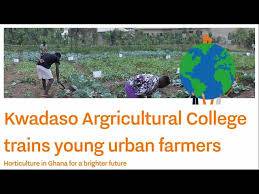Are Allowances Paid to Students of Agriculture Colleges in Ghana Truncated?
In Ghana, the education system has long been a focal point for national development, with particular emphasis on equipping students with practical skills that can drive the agricultural sector forward. Agriculture colleges play a crucial role in this, producing skilled graduates who can contribute to food security and rural development. However, one pressing concern that has emerged is whether the allowances provided to these students are adequately funded or truncated.
Historically, students enrolled in agricultural colleges have received allowances from the government, intended to cover basic living expenses while they pursue their studies. These allowances are vital, as many students come from economically disadvantaged backgrounds and rely on this financial support to afford necessities such as transportation, food, and educational materials. However, there have been persistent complaints regarding the irregularity and inadequacy of these payments, raising questions about their reliability.
Reports from various agricultural colleges indicate that students often experience delays in receiving their allowances, sometimes going months without any payment. This inconsistency not only affects their day-to-day lives but also impacts their academic performance. Students may find it challenging to concentrate on their studies when basic needs are unmet. Moreover, the uncertainty surrounding allowance payments can lead to increased stress and anxiety, further detracting from their educational experience.
The government’s budgetary allocations for these allowances have frequently been cited as a root cause of the problem. Financial constraints, shifting priorities, and inadequate planning have all contributed to the truncation of these essential funds. Despite the government's commitment to promoting agriculture and enhancing food security, the support for students in agricultural colleges appears to be waning. This inconsistency in funding reflects broader challenges within the national education budget, where resources are often stretched thin across various sectors.
In response to these challenges, student advocacy groups have emerged, calling for greater accountability and transparency in the disbursement of allowances. They argue that students deserve consistent financial support that reflects the government's commitment to education and agricultural development. These groups emphasize that ensuring timely and adequate allowances is not only a matter of financial assistance but also a strategic investment in the nation’s future agricultural leaders.
Additionally, some stakeholders suggest that the government should consider alternative funding models, such as partnerships with private sector actors or international organizations, to supplement government funding. Engaging the private sector could lead to innovative solutions and additional resources that enhance the support available to students.
The implications of truncated allowances extend beyond individual students; they pose a significant risk to the agricultural sector's sustainability and growth. If students are unable to complete their education or are less inclined to pursue careers in agriculture due to financial insecurity, Ghana risks losing a generation of skilled professionals crucial for enhancing agricultural productivity.
In conclusion, while allowances for students in agricultural colleges are intended to support their education and development, issues of truncation and irregular payments are concerning. Addressing these challenges requires a concerted effort from the government, educational institutions, and civil society to ensure that students receive the support they need to thrive. By investing in the future of agriculture education, Ghana can foster a more robust agricultural sector, contributing to national development and food security.


